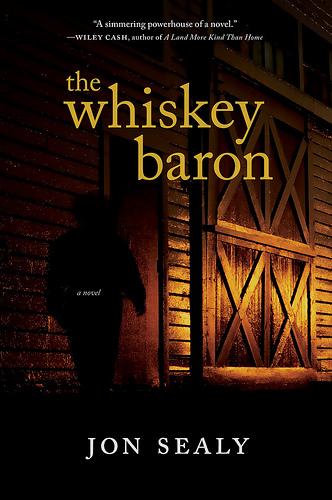264 pages, $26.00
Review by Denton Loving
Jon Sealy’s debut novel, The Whiskey Baron, begins with the not-very-mysterious deaths of two young men outside a known whiskey mill in Prohibition-era South Carolina. These men have both been shot down in the middle of the night, their bodies left in the street. What follows is not a mystery of who committed the crime as much as a beautiful and brilliant exploration of a Carolina mill town—intricately bound in violence and vice—unravelling at its core.
Center stage in this story is a man named Mary Jane Hopewell, accused of the murders but known better as a drunk. Mary Jane is injured himself, barely escaping the first gun fight and then disappearing from Sealy’s fictional Castle County. Two men are looking for Mary Jane, each desperate to find him first. One is Furman Chambers, Castle County’s aging sheriff. The other is Larthan Tull, the man whose liquor supplies a powerful bootleg distributor for the entire Southern region. The different paths of these two men are emphasized by their similarities, and much of the essence of the novel is revealed in their conversations with each other:
“You never know what kind of violence the human beast is capable of, Furman, once he sees through the illusion of free will.”
“Free will.”
“We’re all locked on a stage here. You’ve got a job to do. I’ve got a job to do. Mary Jane’s job was to get drunk. As long as we play our parts, everything runs along smoothly. The show goes on. It’s only when the curtain is pulled back and we see the scaffolding and the strings that we realize something is amiss. And then, who knows?”
Free will and predetermination are ideas Sealy returns to throughout the novel. Supporting both lines of thought are numerous incidents of violence. By pursuing questions of plot, Sealy adroitly explores these far deeper questions, as well as the continued battle of good and evil.
While most people in Castle County respect Sheriff Chambers, they desire Tull’s liquor, not to mention the money he pays for their excess corn. They also fear Tull, who is rumored to know things he shouldn’t know. One character warns: “You can deal with a man, but when the devil comes to collect, your days of wheeling and dealing are over. Now you tell me, when Larthan Tull shows up at your door to collect, can you deal with him like a man, or does he collect like the Devil?”
The Whiskey Baron is an exciting, page-turner of a story, but it’s also far more. Sealy’s voice is precise throughout, as are his insights of human nature. The history of this unique time period in South Carolina’s mill history is explored with a keen eye and ear.
It’s clear that Sealy knows and understands the landscape he’s writing about, and he uses location and setting to create a true and memorable sense of place, sometimes to near mythic conclusions: “The Catawba and Broad rivers bracketed Castle County. Lazy, wide, and brown, they flowed south out of North Carolina and became the Tigris and Euphrates of the South Carolina textile boom. Cotton mills lined their banks like the beginnings of civilization, the first weak and stumbling steps of progress.”
The Whiskey Baron is Sealy’s first novel but not the first time he has mined South Carolina’s upcountry for interesting characters and memorable tales. Sealy’s stories have appeared in significant journals such as The Sun, The Normal School and here at [PANK].
Sealy knows this landscape and place because he’s writing about his home. He writes about it masterfully, coming to the page from the same tradition of writers such as Cormac McCarthy, Ron Rash and Mark Powell, any of whom could be poster boys for defining sense of place in Southern literature. Rash, himself, has declared Sealy “a significant new voice in Southern fiction,” and readers of The Whiskey Baron are sure to agree.
***
Denton Loving lives near the historic Cumberland Gap, where Tennessee, Kentucky and Virginia converge. He serves as editor of drafthorse: the literary journal of work and no work and volume 4 of the Motif Anthology Series. His fiction is forthcoming in River Styx and Flyleaf. Follow him on twitter @DentonLoving.
![[PANK]](https://pankmagazine.com/wp-content/themes/pank/assets/images/pank-logo-large.png)

